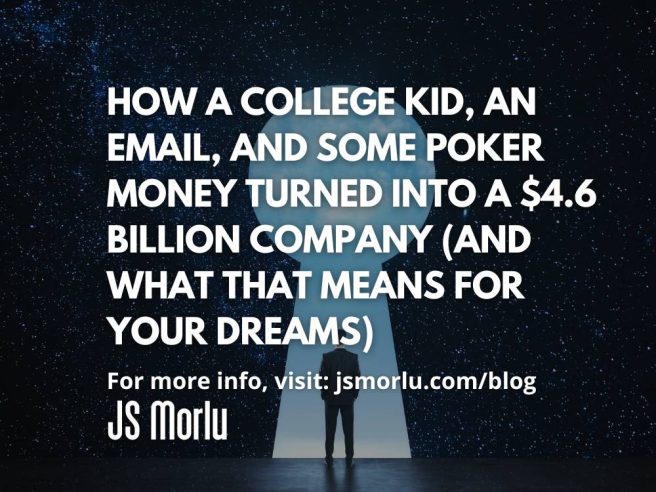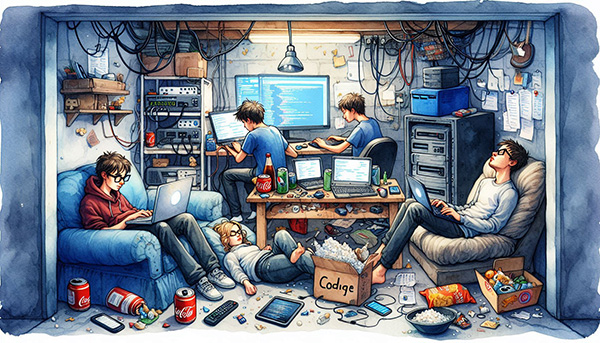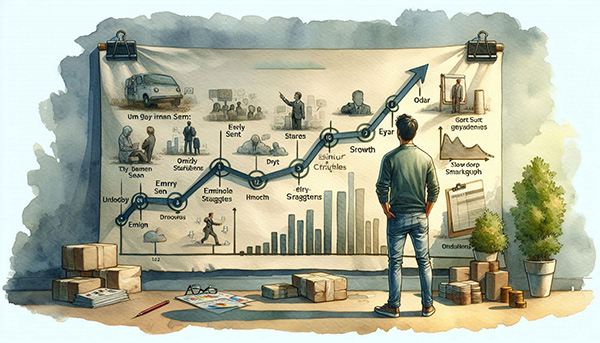By: John S. Morlu II, CPA
Imagine you’re 20 years old, sitting in your college dorm room surrounded by instant noodles, dirty laundry, and big dreams. Instead of binge-watching TikToks or arguing about who stole your charger, you’re building a cloud storage company with your buddy who made $20,000 playing online poker.
Sound crazy? Welcome to the story of Box — the company now worth $4.6 billion that began in a garage, fueled by spam emails, zero paychecks, and the wildest “YOLO” moment in investment history.
This isn’t just a tech fairy tale. This is a lesson in guts, timing, and sending bold emails while your friends are asleep.
Chapter 1: The Dorm Room Dream (a.k.a. Cloud Storage on Instant Ramen)
Back in 2005, Aaron Levie was just a regular college kid at the University of Southern California. But unlike most students, he wasn’t just skipping class or stress-eating burritos—he was starting a tech company in his dorm room.
He and his co-founder Dylan Smith needed money to get things going. So what did Dylan do? He used $20,000 of his online poker winnings. Yes. They literally bet on cloud storage.
That’s right. While some students were using poker money to buy pizza and Xbox games, these guys used it to build servers and pay engineers.
It’s like if your friend won a Fortnite tournament and then launched a tech company instead of buying a gold-plated gaming chair.
Takeaway? Sometimes your best seed funding is your friend with fast internet and gambling skills.
Chapter 2: “Dear Billionaire, Please Read This Email”
Even with poker cash, they needed real money. So Levie did what most people are afraid to do—he emailed random investors. All of them. Like, hundreds.
“If you had a bank account and a LinkedIn profile in 2005, I probably emailed you,” Levie said.
Then—BOOM—he gets an email back. Not from some bored rich guy. But from Mark Cuban, the billionaire owner of the Dallas Mavericks, future Shark Tank legend, and world-class email deleter.
Fun Fact: Cuban gets over 1,000 emails a day. He deletes 90% of them faster than most people delete junk mail. But something about Levie’s email made him stop, read, and reply.
Within HOURS, Cuban agreed to invest $350,000—without even meeting them. That’s like winning Shark Tank in your pajamas.
Let’s be real: This is the adult version of texting your crush “Hey” and they reply, “Let’s get married.”
No pitch deck. No Zoom call. No pitch competition with judges in tight blazers. Just raw guts and a Gmail account.
Chapter 3: Attics, Garages, and No Paychecks
With Cuban’s money in the bank, the team moved into… Smith’s parents’ attic. (Yes, even billion-dollar dreams start under your mom’s roof.) Then they upgraded to Levie’s uncle’s garage in Berkeley, California.
They hired part-time engineers. Paid for servers. Set up a 1-800 number for customer service (which was probably just one of them with a headset and a polite voice).
They didn’t pay themselves a dime. Just worked. Ate snacks. Wrote code. Slept on couches. Probably cried a few times. But hey—that’s startup life.
There was no fancy espresso machine. No bean bags. No “Chief Innovation Officer.” Just ideas, hustle, and prayers the servers didn’t crash.
Chapter 4: The Breakup with Mark Cuban (It’s Not You, It’s Freemium)
One year in, Box made a big decision. They wanted to switch to a freemium model—give people free storage so they’d sign up and later pay for more.
Cuban wasn’t having it.
He didn’t like “free.” He didn’t like giving stuff away. He’s a businessman, not Santa Claus.
So, Cuban walked away and sold his shares. He cashed out before the company blew up. Ouch.
Later, in 2014, when Box had its big IPO (valued at $1.7 billion), Cuban tweeted that he would “combust” if he ran a company losing more money than it made.
Spoiler Alert: Box didn’t turn a real profit until 2023, almost 18 years after the first cold email.
Lesson? Building a great company is not like making microwave popcorn. It’s more like smoking brisket: low, slow, and it might burn you.
Also—sometimes your first believer doesn’t stay for the final act. That’s fine. Their role was to light the match—not carry the torch.
Chapter 5: From Inbox to IPO (and Finally Making Money)
Let’s pause and zoom out:
- 2005: Email sent.
- 2006: Breakup with Cuban.
- 2014: IPO at $1.7 billion—still no profit.
- 2023: First profit: $129 million.
- 2025: Box is now worth $4.6 billion.
It took nearly two decades to go from “Hey, we’re in a garage” to “We’re finally making money.” That’s longer than most people keep their gym memberships or marriages.
And for all the years it was burning cash, growing users, and trying to explain what the heck cloud storage even was, Box stayed the course.
Real Talk: Amazon didn’t make a profit for 9 years. Tesla was a bankruptcy drama series for over a decade. Airbnb got rejected by 7 investors who probably now use Airbnb just to cry in peace.
Even YouTube didn’t make money until Google bought it and gave it a lifeline of ads, autoplay, and cooking videos.
Final Chapter: What You Should Learn from This (Besides Not Deleting Important Emails)
Here’s the deal:
1. It takes time to build something real.
2. Audacity wins.
3. Don’t fear rejection.
4. Be weirdly confident.
5. Invest in yourself, even if it looks silly.
6. Timing matters, but so does showing up.
Bonus Fun Facts (a.k.a. Startup Truth Nuggets)
- Mark Zuckerberg built Facebook in a dorm too. (He just had better lighting.)
- Walt Disney was told he “lacked imagination.”
- Colonel Sanders got rejected 1,009 times before someone agreed to sell his chicken.
- Steve Jobs started Apple in a garage, too—but at least it was a California garage with nice weather.
So next time someone says “that’ll never work,” just smile and say, “Neither did Box. Until it did.”
And if your idea sounds crazy? Good. You might just be onto something.
And Finally…
Want to build something big? Send that email. Bet on yourself. Sleep in the garage if you have to. And if someone replies, even better. If not? Keep going.
Because your dream isn’t broken—it’s just waiting for the right billionaire to check their inbox.
About the Author
John is an entrepreneur, strategist, and founder of JS Morlu, LLC, a Virginia based CPA firm with multiple software ventures including www.FinovatePro.com, www.Recksoft.com and www.Fixaars.com . With operations spanning multiple countries, John is on a mission to build global infrastructure that empowers small businesses, entrepreneurs, and professionals to thrive in an increasingly competitive world. He believes in hard truths, smart execution, and the relentless pursuit of excellence. When he’s not writing or building, he’s challenging someone to a productivity contest—or inventing software that automates it.
JS Morlu LLC is a top-tier accounting firm based in Woodbridge, Virginia, with a team of highly experienced and qualified CPAs and business advisors. We are dedicated to providing comprehensive accounting, tax, and business advisory services to clients throughout the Washington, D.C. Metro Area and the surrounding regions. With over a decade of experience, we have cultivated a deep understanding of our clients’ needs and aspirations. We recognize that our clients seek more than just value-added accounting services; they seek a trusted partner who can guide them towards achieving their business goals and personal financial well-being.
Talk to us || What our clients says about us







